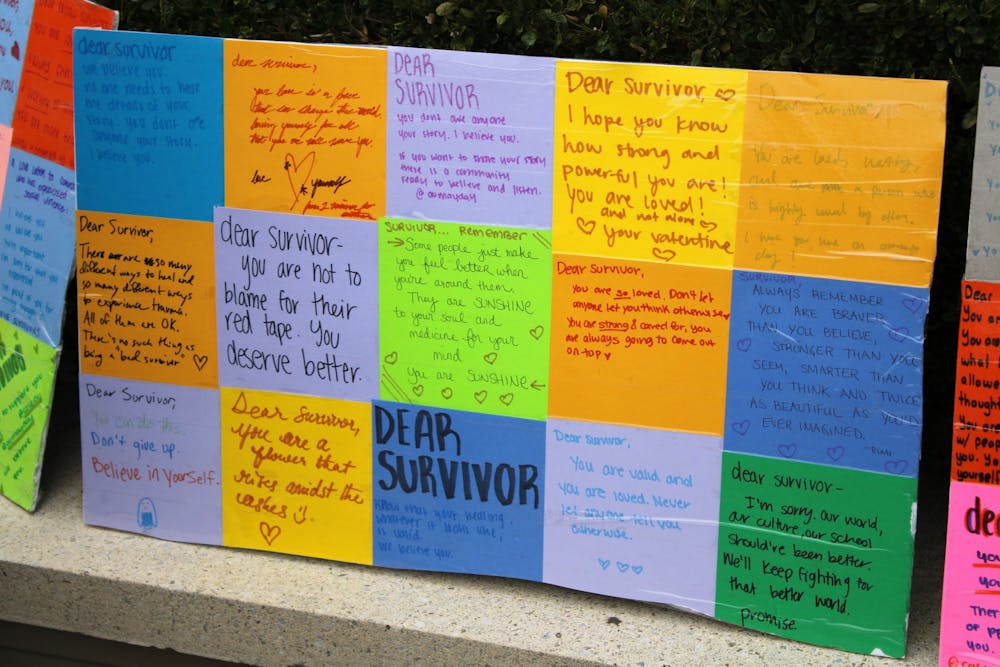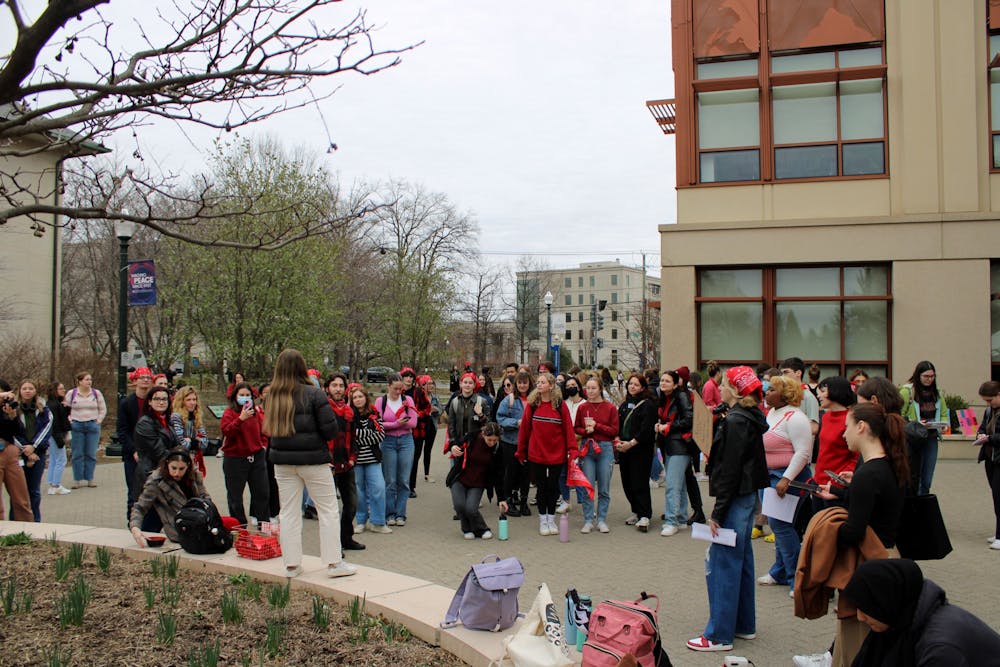Editor’s Note: This article contains references to sexual violence and sexual assault.
For the second time in three months, students protested a lack of action from the University in implementing demands created in response to a sexual assault that took place in Leonard Hall last semester.
The Feb. 22 protest, which was smaller than the fall semester’s, was timed to coincide with the fourth meeting of the Community Working Group on Preventing and Responding to Sexual Harassment and Violence. As administrators walked past the protest in front of the School of International Service, they faced boards filled with letters of support written to survivors of sexual violence.
University officials received a list of five demands with over 1,400 signatures from AU students, staff, faculty, alumni and other supporters in November. None of the demands have been met so far.
The demands propose the University create a survivor’s bill of rights; mandate live, annual sexual violence trainings for students, faculty, staff and student employees; hire a trauma-informed counselor specifically trained in sexual violence response; and update the Title IX website monthly.

Survivor love letters on display outside of SIS during the protest.
'My experience is not a unique one'
Lillian Frame, a senior in the School of Public Affairs and one of the organizers of the protest, called for “immediate and radical change” that has a greater focus on protecting students.
“Students are watching, are ready to act, and are demanding more,” Frame said. “[The administration] are scared of us.”
Emma Grasso Levine, the manager of the survivor and youth-led project Know Your IX, spoke about how every one of the demands outlined could be legally implemented immediately. Levine said she was tired of schools, including AU, not prioritizing violence prevention and survivor resources on campuses.
“The cost of an education should never include sexual violence, but [with] AU’s current policies, for so many students, that cost is included in their tuition,” Levine said.
Kimberly Kraska, a sophomore in SPA, identified herself as a victim of domestic violence in her speech and detailed the difficulties she had working with the Title IX office to obtain protection from an abusive ex-boyfriend.
When Kraska’s hearing came around after five months of investigation and she could no longer attend, AU’s Office of Equity and Title IX maintained that the hearing could not be rescheduled.
“The Title IX office failed me, and unfortunately my experience is not a unique one,” Kraska said.
Mari Santos, a freshman in SPA, spoke about her experience being sexually harassed and stalked by her neighbor in the fall of 2022.
“My first semester was a hell on earth,” she said. Over a month after Santos first spoke with the Title IX office about her experience, the Office told her she could not get a no-contact order against her neighbor because he had not physically assaulted her.
This decision by AU’s Title IX office violates both federal and AU Title IX law, specifically section III-J-6, which states that stalking qualifies under Title IX’s definition of sexual harassment. The section does not state that physical assault is required to qualify as stalking.
“We are legally prohibited from publicly commenting nor confirming the receipt of any complaint by the Office of Title IX, as protected by the Family Education Rights and Privacy Act (FERPA),” said Elizabeth Deal, assistant vice president for community and internal communication.
She also said that “general physical assault is handled under the Student Code of Conduct not the Office of [Equity and Title IX].”
Santos secured a room change through the Office of Housing and Residence Life in early November. She says she only received this room change after a month of persistent communication and “begging” the housing office.
“I am the reason I got what I wanted,” Santos said. “Not Title IX, and not the Dean of Students.”
Shed Siliman, a teaching and learning specialist for the Center for Teaching, Research and Learning, represented the AU Staff Union at the protest. She said that students had come out to support faculty and staff during their protests and staff wanted to show the same courtesy towards those protesting on Wednesday.
“We're told that AU leadership finds sexual violence unacceptable, that safety is a top priority, and that all necessary resources will be mobilized to end sexual violence at AU and yet here we are, after all this time,” Siliman said.
Montague Chevallier, a sophomore in SPA, is the Men in Pride coordinator for AU Pride and discussed his experiences as a trans man and a sexual abuse survivor in his speech at the protest. He said that trans people are an essential group of the conversation surrounding sexual assault and abuse that is often left out.
“Sexual liberation includes queer people too,” Chevallier said.
Julia Comino, a sophomore in the School of Communication and SPA and a survivor, spoke about an interaction she had with AU President Sylvia Burwell at a working group meeting.
“I asked [Burwell] if she could name a single specific action that the administration had taken or plan to take to address sexual violence on this campus,” Comino said. “She told me she didn’t have time for my question.”
Comino said that when she asked the question again, a member of Burwell’s staff grabbed her arm and pulled her away from the president.
In response to this Deal wrote in an email, “President Burwell and Ms. Comino met at the conclusion of the January CWG meeting and had a brief discussion. Following the two-hour CWG session, President Burwell had another university function to attend and needed to depart. To thoroughly address Ms. Comino’s question, she was introduced to Matt Bennett, AU’s chief communications officer and one of the administrative leads for the CWG. Mr. Bennett and Ms. Comino spoke following the CWG meeting and had several subsequent email exchanges where her question regarding university actions was answered, as well as additional questions she asked. The description of President Burwell’s departure is not accurate.”
Comino emphasized the importance of calling out perpetrators, listening to survivors and being a support system for those in need.
“Change the culture,” she said. “We have the power to end sexual violence on this campus, with or without the administration's cooperation.”
Comino also shared her frustration with the University’s emphasis on communication rather than taking action on implementing the demands.
“Although conversation is nice, it’s conversation students have already had, so it’s inaction,” Comino said.
The University is working to identify the gaps, officials say
Matthew Bennett, AU’s vice president and chief communications officer, told The Eagle that the University’s approach to handling the demands was a “two-track process,” with one of the tracks being formal working group meetings and the other being the “work that is happening everyday between meetings” of looking over information resources, policies and procedures.
Since November, the administration has completed two actions. Bennett said “phase one” was updating the Title IX website and updating the survivor resource stickers in all of the restrooms on campus.
Bennett said the final recommendations from the Community Working Group will be shared with the AU community in April.
The timeline for implementing the final recommendations will depend on the feasibility, complexity and resources involved for the recommendations, Bennett said.
“Even when the systems are working incredibly well, which they do in a lot of cases, there are always gaps,” Bennett said. “How do we identify and work on those gaps continuously moving forward?”
'We will keep showing up and keep fighting'
Katie Plummer, a senior in SPA, attended the protest as a volunteer with the Every Voice Coalition. The group is in the process of writing and passing sexual assault survivor-centered bipartisan legislation. She handed out flyers with QR codes for attendees to learn more about EVC and submit impact statements.
Plummer said it was impactful yet difficult to hear survivors tell their stories at the protest. When asked about the administration, she said, “I just hope that they heard us today.”
Ethan Gaskill, a junior in SPA, held up survivor love letters and said a few people stopped to read the signs and thanked the students who were holding them. He also shared that he felt that men on campus needed to step up their support for this issue.
“I'm conscious of the fact that a lot of the people leading this space are women and nonbinary, and so it's rare to see men sort of stick their necks out for it to try to stop sexual violence,” Gaskill said. “It doesn’t surprise me that this campus is mostly women and nonbinary people, and we still have a huge sexual assault problem, and the few men that are here aren't speaking up about it.”
Lilliana Silver, a junior in the College of Arts and Sciences and SPA, also volunteered at the protest and held up survivor love letters as administrators walked to the Community Working
Group meeting.
“I hope that administration listens and takes us seriously, and I hope they realize that we will keep showing up and keep fighting against sexual violence on campus until they listen to our demands,” she said. “Change takes work, and they don't want to put in the work, but the students will.”
This story was edited by Abigail Pritchard, Jordan Young and Nina Heller. Copy editing by Isabelle Kravis, Leta Lattin, Luna Jinks, Sarah Clayton and Stella Guzik.





